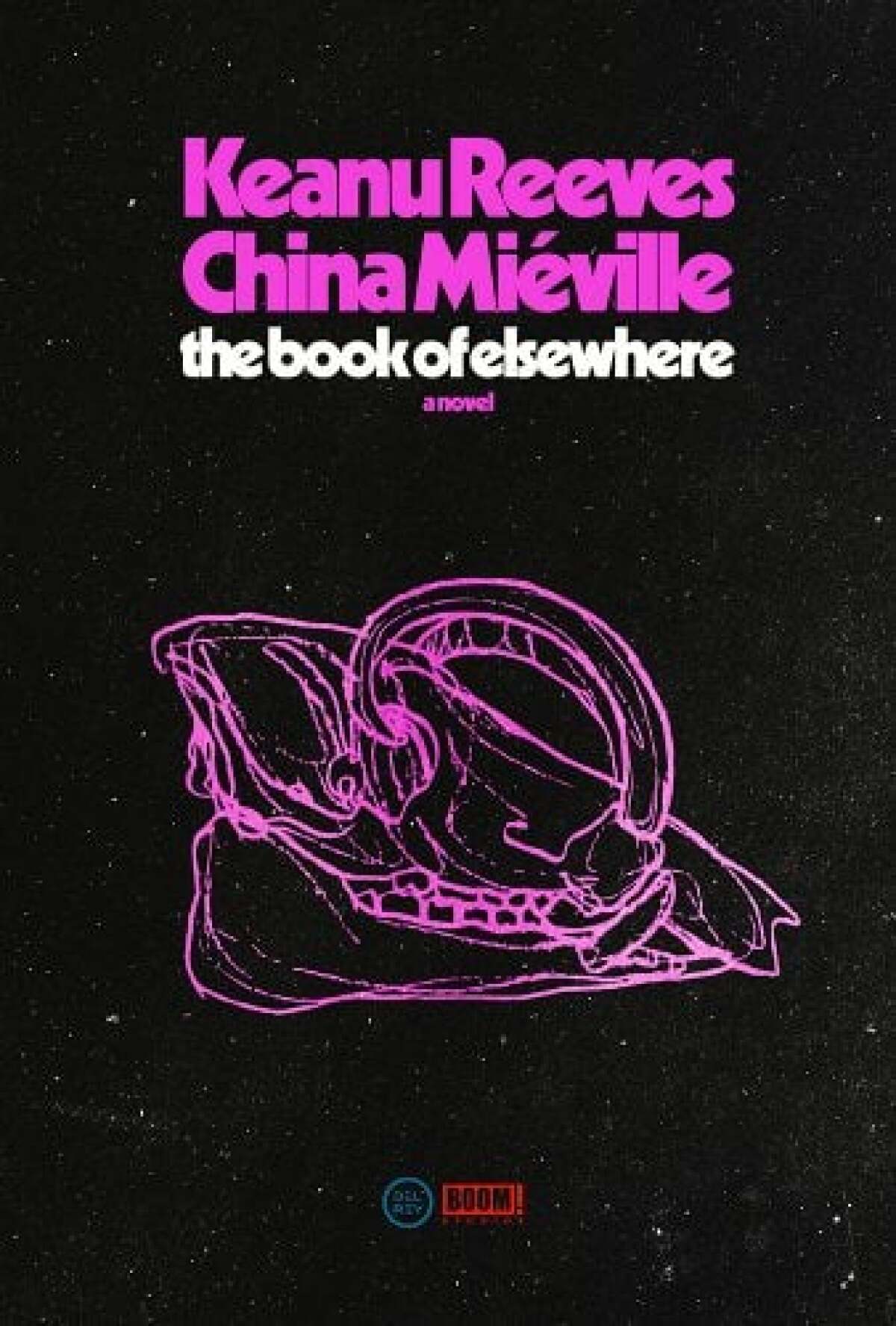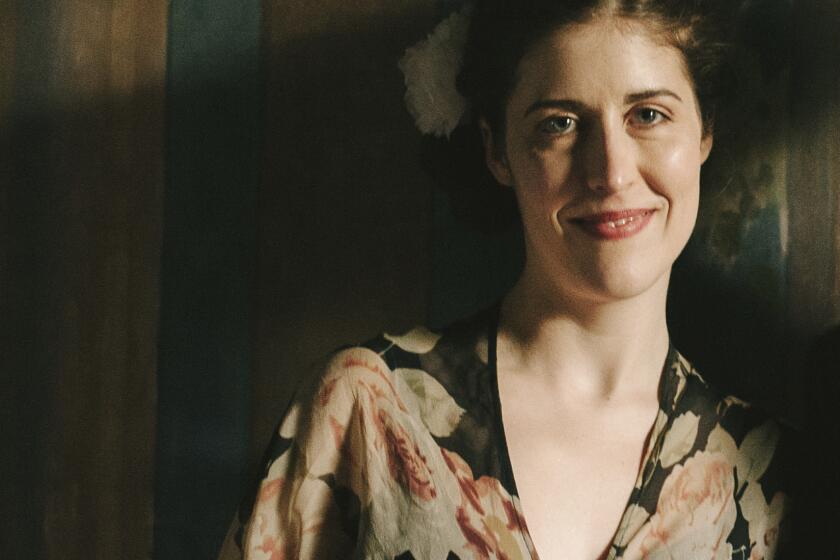A novel co-written by Keanu Reeves is actually great (and just waiting to be adapted into his next flick)

- Share via
Book Review
The Book of Elsewhere
By Keanu Reeves and China Miéville
Del Rey Books: 352 pages, $30
If you buy books linked on our site, The Times may earn a commission from Bookshop.org, whose fees support independent bookstores.
Not to brag, but when I was a tween, I scored a personalized signed photograph of Keanu Reeves in “The Matrix Reloaded.” Although I’ve long outgrown my enthusiasm for celebrity autographs, I’m hardly alone in still being a fan — of the actor’s films, yes, but also of his dating an age-appropriate artist (the bar really is that low for men in Hollywood), founding a small press with her specializing in artists’ books and being a generally nice guy. So when I heard a few months ago that Reeves had paired up with China Miéville on a novel, “The Book of Elsewhere,” I was delighted.

The idea of them working together was pleasing: Like Reeves, the acclaimed author of “Perdido Street Station,” “Embassytown,” “The City & The City” and many others has a sort of could-beat-you-up mien that is belied by his soft-spoken demeanor. And as a longtime fan of Miéville’s books, I couldn’t see him working on a project that merely stroked celebrity vanity, and so was genuinely looking forward to his first novel in more than a decade, regardless of its co-author. While I had reservations when I first started the book — its prologue is written in a jerky, staccato style that reads rather like scene descriptions in screenplays — I was soon won over by Miéville’s otherwise lush prose and his and Reeves’ melancholy romp of a narrative.
A fictional comet’s portent-filled appearance brings together a grieving widow, the comet’s discoverer and a group of true believers in Australia.
“The Book of Elsewhere” follows Unute, a man who cannot die. Born from lightning and his mother’s prayers, Unute has been alive for roughly 80,000 years, and over the course of his many millennia has seen civilizations, species, technologies, mythologies and religions rise and fall. He has died over and over again — not that he’s easy to kill — only to be reborn each time within a human-size egg sac. He’s been worshiped as a god and feared as a demon, although he doesn’t believe he is either. And he is, in the 21st century, in the rather mundane position of being involved with the U.S. Army’s Special Forces, who’ve decided that his berserks — the frenzied states in which he commits horrific violence against anyone in his path — are useful.
So far, so tropey, and for good reason. “The Book of Elsewhere” works completely as a stand-alone novel, but it’s technically a tie-in to the existing IP of Reeves’ 12-issue comics series, “BRZRKR,” which was funded via an extremely successful Kickstarter. He is also producing and starring in a film adaptation for Netflix (Unute’s physical characteristics were clearly modeled after the actor’s, presumably for this very reason). In other words, the new novel’s source material knows what it is — action-packed, ultraviolent and morally ambiguous — and Miéville clearly took that to heart when agreeing to work with Reeves. As he told Wired: “If you come in wanting horrible violence and a helicopter chase, you’re going to get it, because it would be cheating to not give you that.”
The second novel from Taffy Brodesser-Akner is even more ambitious and suggests this author’s talents are boundless.
There aren’t any helicopter chases, per se, in the novel, but Miéville’s point stands: “The Book of Elsewhere” includes plenty of lovingly described moments of brutality, when Unute loses himself to his berserks: “he, in the rising riastrid glory, fists, the gun, that wet burrow of bullets into his self, and rip bite shoot gouge, and stay back, comrades, stay back, investigators of and companions to this immortal flesh, because here he was on a mission and bang cut slice.”
I don’t know how the co-authors divided the book’s labor, but from the few interviews I found, it sounds like the pair came up with an outline together and the words are largely Miéville’s. This tracks, because once I pushed through the awkward opening pages, I discovered a profoundly stylish and beautiful approach to the trials and tribulations of the ancient warrior who cannot die.
The novel’s main plotline follows a series of strange events such as the brief reanimation of a soldier in Unute’s unit, the arrival of an immortal babirusa (a kind of pig) and the recent emergence of a self-help group in town. Unute and his handlers suspect these are all connected, although it’s not clear until late in the book what factions are involved and who is loyal to whom. It’s an enjoyable action-mystery cut through with moments of existential melancholy as Unute tries to reckon with what he is. Even after all these eons of undeath, he still doesn’t really know.
Where “The Book of Elsewhere” really shines, though, is when it departs from its contemporary setting. Alternating chapters give voice to the stories of other characters throughout history encountering Unute. Readers meet a doctor (who it is strongly implied is Sigmund Freud) to whom Unute tells the truth about his immortality, an intersex servant Unute saves from likely gang rape, a woman Unute married and loved deeply only to abruptly leave her without explanation, and others whose lives brushed against his. In other chapters, Unute narrates elements of his internal life using second person perspective: “You long ago identified in yourself, no matter what evidence you amass that the thought is folly, a sense of toldness. That certain things must be, to make the shape of life a story. You have seen such hankering in most of the people you’ve known. It is because you share that dangerous inclination that you hesitate to say you are not human.”
Both sets of chapters add depth to Unute, bringing his predicament — he is an immortal who wishes he weren’t — to emotionally satisfying and morally complex places.
While “The Book of Elsewhere” may include some tropes and contrivances, Miéville’s keen eye, brimful imagination and impeccable style make it a deeply pleasurable read.
Ilana Masad is a books and culture critic and author of “All My Mother’s Lovers.”
More to Read
A cure for the common opinion
Get thought-provoking perspectives with our weekly newsletter.
You may occasionally receive promotional content from the Los Angeles Times.








